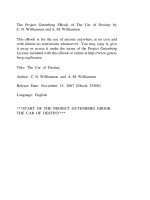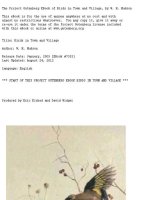The Project Gutenberg EBook of Concerning Animals and Other Matters by E.H. Aitken doc
Bạn đang xem bản rút gọn của tài liệu. Xem và tải ngay bản đầy đủ của tài liệu tại đây (2.5 MB, 476 trang )
The Project Gutenberg EBook of Concerning
Animals and Other Matters
by E.H. Aitken, (AKA Edward Hamilton)
This eBook is for the use of anyone
anywhere at no cost and with
almost no restrictions whatsoever. You may
copy it, give it away or
re-use it under the terms of the Project
Gutenberg License included
with this eBook or online at
www.gutenberg.net
Title: Concerning Animals and Other
Matters
Author: E.H. Aitken, (AKA Edward Hamilton)
Release Date: February 6, 2004 [EBook
#10962]
Language: English
*** START OF THIS PROJECT GUTENBERG EBOOK
CONCERNING ANIMALS ***
Produced by Garrett Alley and the Online
Distributed Proofreading Team
CONCERNING
ANIMALS AND
OTHER
MATTERS
BY E.H. AITKEN ("EHA")
AUTHOR OF "FIVE WINDOWS OF
THE SOUL," "TRIBES ON MY
FRONTIER," ETC.
WITH A MEMOIR OF THE AUTHOR
BY
SURGEON-GENERAL W.B.
BANNERMAN I.M.S., C.S.I.
WITH ILLUSTRATIONS BY J A.
SHEPHERD AND A PORTRAIT
LONDON
JOHN MURRAY, ALBEMARLE
STREET, W.
1914
CONTENTS
LIST OF ILLUSTRATIONS
INTRODUCTION
I FEET AND HANDS
II BILLS OF BIRDS
III TAILS
IV NOSES
V EARS
VI TOMMY
VII THE BARN OWL
VIII DOMESTIC ANIMALS
IX SNAKES
X THE INDIAN SNAKE-CHARMER
XI CURES FOR SNAKE-BITE
XII THE COBRA BUNGALOW
XIII THE PANTHER I DID NOT SHOOT
XIV THE PURBHOO
XV THE COCONUT TREE
XVI THE BETEL NUT
XVII A HINDU FESTIVAL
XVIII INDIAN POVERTY
XIX BORROWED INDIAN WORDS
Special thanks are due to the Editors
and Proprietors of the Strand Magazine,
Pall Mall Magazine and Times of India
for their courtesy in permitting the
reprinting of the articles in this book
which originally appeared in their
columns.
LIST OF
ILLUSTRATIONS
HALF-TONES
1. Portrait of 'Eha.'
2. The Nose of the Elephant Becoming
a Hand Has Redeemed Its Mind
3. Good for any Rough Job
4. Here the Competition Has Been Very
Keen indeed.
5. A Blackbird and a Starling—the one
Lifts Its Skirts, While the Other Wears a
Walking Dress.
6 . The Nostrils of the Apteryx Are at
the Tip of Its Beak.
7. The Long-Nosed Monkey.
LINE BLOCKS
8. An Authentic Standard Foot.
9. These Beasts Are All Clodhoppers,
and their Feet Are Hobnailed Boots.
10. It Has to Double them Under and
Hobble About Like a Chinese Lady.
11. No Doubt Each Bird Swears by Its
Own Pattern.
12. Its Bill Deserves Study
13. As Wonderful As the Pelican, But
How Opposite!
14. There Are Some Eccentrics, Such
As Jenny Wren, Which Have Despised
their Tails.
1 5. At the Sight of a Rival the Dog
Holds Its Tail up Stiffly
16. A Shrew Can Do It, But Not a Man.
17. A Bold attempt to Grow in the Case
of a Tapir
1 8. I Have Seen Human Noses of a
Pattern Not Unlike This, But they Are Not
Considered Aristocratic.
1 9 . Who Can Consider That Nose
Seriously?
20. Or Perhaps when It Wants to Listen
It Raises a Flipper to Its Ear.
21. 'Tear out the House Like the Dogs
Wuz atter Him.'
2 2 . A Great Catholic Congress of
Distinguished Ears.
23. The Curls of a Mother's Darling.
INTRODUCTION
"EHA"
Edward Hamilton Aitken, the author of
the following sketches, was well known to
the present generation of Anglo-Indians,
by his pen-name of Eha, as an accurate
and amusing writer on natural history
subjects. Those who were privileged to
know him intimately, as the writer of this
sketch did, knew him as a Christian
gentleman of singular simplicity and
modesty and great charm of manner. He
was always ready to help a fellow-worker
in science or philanthropy if it were
possible for him to do so. Thus, indeed,
began the friendship between us. For
when plague first invaded India in 1896,
the writer was one of those sent to
Bombay to work at the problem of its
causation from the scientific side, thereby
becoming interested in the life history of
rats, which were shown to be intimately
connected with the spread of this dire
disease. Having for years admired Eha's
books on natural history—The Tribes on
my Frontier, An Indian Naturalist's
Foreign Policy, and The Naturalist on
the Prowl, I ventured to write to him on
the subject of rats and their habits, and
asked him whether he could not throw
some light on the problem of plague and
its spread, from the naturalist's point of
view.
In response to this appeal he wrote a
most informing and characteristic article
for The Times of India (July 19, 1899),
which threw a flood of light on the subject
of the habits and characteristics of the
Indian rat as found in town and country.
He was the first to show that Mus rattus,
the old English black rat, which is the
common house rat of India outside the
large seaports, has become, through
centuries of contact with the Indian
people, a domestic animal like the cat in
Britain. When one realises the fact that
this same rat is responsible for the spread
of plague in India, and that every house is
full of them, the value of this naturalist's
observation is plain. Thus began an
intimacy which lasted till Eha's death in
1909.
The first time I met Mr. Aitken was at a
meeting of the Free Church of Scotland
Literary Society in 1899, when he read a
paper on the early experiences, of the
English in Bombay. The minute he entered
the room I recognised him from the
caricatures of himself in the Tribes. The
long, thin, erect, bearded man was
unmistakable, with a typically Scots face
lit up with the humorous twinkle one came
to know so well. Many a time in after-
years has that look been seen as he
discoursed, as only he could, on the ways
of man and beast, bird or insect, as one
tramped with him through the jungles on
the hills around Bombay during week-
ends spent with him at Vehar or
elsewhere. He was an ideal companion on
such occasions, always at his best when
acting the part of The Naturalist on the
Prowl.
Mr. Aitken was born at Satara in the
Bombay Presidency on August 16, 1851.
His father was the Rev. James Aitken,
missionary of the Free Church of
Scotland. His mother was a sister of the
Rev. Daniel Edward, missionary to the
Jews at Breslau for some fifty years. He
was educated by his father in India, and
one can well realise the sort of education
he got from such parents from the many
allusions to the Bible and its old
Testament characters that one constantly
finds used with such effect in his books.
His farther education was obtained at
Bombay and Poona. He passed M.A. and
B.A. of Bombay University first on the
list, and won the Homejee Cursetjee prize
with a poem in 1880. From 1870 to 1876
he was Latin Reader in the Deccan
College at Poona, which accounts for the
extensive acquaintance with the Latin
classics so charmingly manifest in his
writings. That he was well grounded in
Greek is also certain, for the writer, while
living in a chummery with him in Bombay
in 1902, saw him constantly reading the
Greek Testament in the mornings without
the aid of a dictionary.
He entered the Customs and Salt
Department of the Government of Bombay
in April 1876, and served in Kharaghoda
(the Dustypore of the Tribes), Uran, North
Kanara and Goa Frontier, Ratnagiri, and
Bombay itself. In May, 1903, he was
appointed Chief Collector of Customs and
Salt Revenue at Karachi, and in
November, 1905, was made
Superintendent in charge of the District
Gazetteer of Sind. He retired from the
service in August 1906.
He married in 1883 the daughter of the
Rev. J. Chalmers Blake, and left a family
of two sons and three daughters.
In 1902 he was deputed, on special
duty, to investigate the prevalence of
malaria at the Customs stations along the
frontier of Goa, and to devise means for
removing the Salt Peons at these posts,
from the neighbourhood of the anopheles
mosquito, by that time recognised as the
cause of the deadly malaria, which made
service on that frontier dreaded by all.
It was during this expedition that he
discovered a new species of anopheline
mosquito, which after identification by
Major James, I.M.S., was named after him
Anopheles aitkeni. During his long
service there are to be found in the Annual
Reports of the Customs Department
frequent mention of Mr. Aitken's good
work, but it is doubtful whether the
Government ever fully realised what an
able literary man they had in their service,
wasting his talent in the Salt Department.
On two occasions only did congenial
work come to him in the course of his
public duty—namely, when he was sent to
study, from the naturalist's point of view,
the malarial conditions prevailing on the
frontier of Goa; and when during the last
two years of his service he was put in
literary charge of The Sind Gazetteer. In
this book one can see the light and
graceful literary touch of Eha frequently
cropping up amidst the dry bones of
public health and commercial statistics,
and the book is enlivened by innumerable
witty and philosophic touches appearing
in the most unlikely places, such as he
alone could enliven a dull subject with.
Would that all Government gazetteers
were similarly adorned! But there are not
many "Ehas" in Government employ in
India.
On completion of this work he retired
to Edinburgh, where most of the sketches
contained in this volume were written. He
was very happy with his family in his
home at Morningside, and was beginning
to surround himself with pets and flowers,
as was his wont all his life, and to get a
good connection with the home
newspapers and magazines, when, alas!
death stepped in, and he died after a short
illness on April 25, 1909.
He was interested in the home birds and
beasts as he had been with those in India,
and the last time the writer met him he
was taking home some gold-fish for his
aquarium. A few days before his death he
had found his way down to the
Morningside cemetery, where he had been
enjoying the sunshine and flowers of
Spring, and he remarked to his wife that
he would often go there in future to watch
the birds building their nests.
Before that time came, he was himself
laid to rest in that very spot in sure and
certain hope of a blessed resurrection.
The above imperfect sketch fails to give
the charm and magnetic attraction of the
man, and for this one must go to his works,
which for those who knew him are very
illuminating in this respect. In them one
catches a glimpse of his plan for keeping
young and cheerful in "the land of regrets,"
for one of his charms was his youthfulness
and interest in life. He refused to be
depressed by his lonely life. "I am only an
exile," he remarks, "endeavouring to work
a successful existence in Dustypore, and
not to let my environment shape me as a
pudding takes the shape of its mould, but
to make it tributary to my own happiness."
He therefore urges his readers to cultivate
a hobby.
"It is strange," he says, "that Europeans
in India know so little, see so little, care
so little, about all the intense life that
surrounds them. The boy who was the
most ardent of bug-hunters, or the most
enthusiastic of bird-nesters in England,
where one shilling will buy nearly all that
is known, or can be known, about birds or
butterflies, maintains in this country, aided
by Messrs. B. &. S., an unequal strife with
the insupportableness of an ennui-smitten
life. Why, if he would stir up for one day
the embers of the old flame, he could not
quench it again with such a prairie of fuel
around him. I am not speaking of Bombay
people, with their clubs and gymkhanas
and other devices for oiling the wheels of









